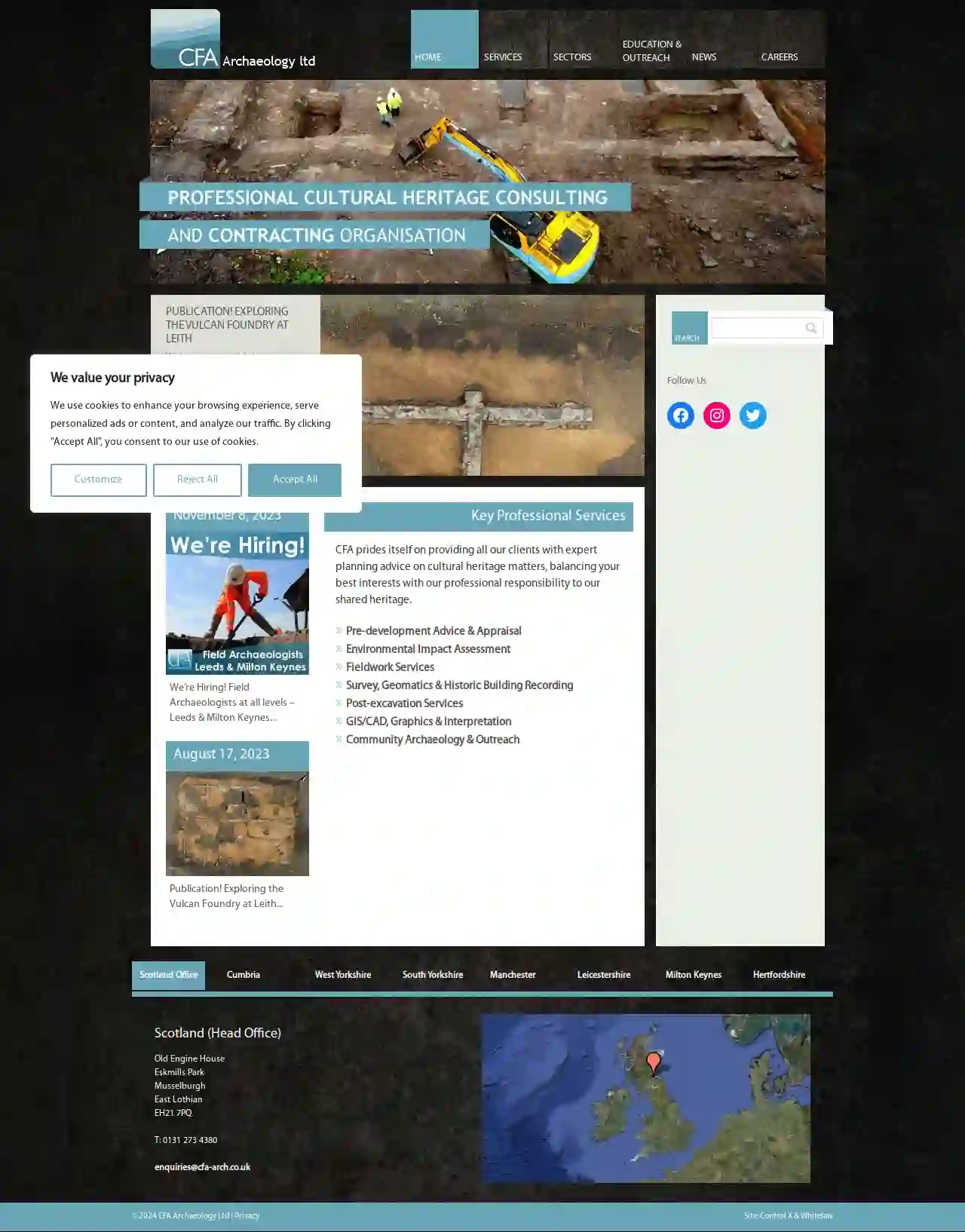Excavation Contractors Worsley
Find the best Excavation Companies in Worsley
Receive multiple Excavation Contractors quotes for your project today! Compare profiles, reviews, accreditations, portfolio, etc... and choose the best service.

Centene Construction
15 Memorial Road, Manchester, 15 Memorial Road Manchester, M28 3AQ, GBCentene Construction - You dream it, we build it! At Centene Construction, we are more than just builders; we are creators of spaces and builders of lasting relationships. Established with a commitment to excellence and a steadfast dedication to quality, integrity, and excellent services, Centene Construction is one of the top construction companies in the UK that has marked its name in building firms. Our team of exceptional professionals bring a wealth of experience and expertise to any project we undertake in residential properties in the UK. We understand that construction projects can be daunting, which is why we provide you with a seamless and stress-free experience. All aspects of the project would be taken care of, from the planning paperwork to the final finishing. We work closely with you and ensure that your dream is realized.
- Services
- Why Us?
- Testimonials
- Gallery
Get Quote
Worsley Drains
56 reviewsSalford, GBThe North West's Leading Drainage Experts Need a drain unblocked fast? You’re in the right place. From blocked toilets, showers and sinks to slow draining baths or broken pipelines, Worsley drains can help. Manchester's Leading Drainage Specialists Worsley Drains offers expert drainage solutions in Manchester, Salford and surrounding areas. From clearances to repairs, we're your reliable local choice for residential and commercial needs. Contact us today for a prompt service and peace of mind. At Worsley Drains, we understand the inconvenience and disruption that blocked drains or drainage problems can cause. That's why our team of skilled professionals is dedicated to delivering prompt, reliable, and cost-effective solutions to our valued customers. Whether it's a simple blockage, drain cleaning, or more complex drainage issues, we have the expertise and equipment to get the job done right the first time. With a commitment to innovation and staying at the forefront of industry advancements, we utilise the latest technology and techniques to ensure the highest standards of quality and efficiency in every project we undertake. If you're experiencing drainage problems or need professional drain services in Worsley or the surrounding areas, trust Worsley Drains to provide reliable solutions tailored to your needs. Contact us today to experience the difference our expertise can make for your drainage needs.
- Services
- Why Us?
- Testimonials
- Gallery
Get Quote
Clarkes Design Build
123 Main Street, Stratford, N0B 2K0, GBBuilding Your Dreams, One Brick at a Time At Clarkes Design Build, we are passionate about transforming your vision into a reality. We are a full-service design-build firm specializing in residential and commercial construction projects. Our team of experienced professionals is dedicated to providing exceptional service and craftsmanship, ensuring your project is completed on time and within budget. We understand that building a home or business is a significant investment. That's why we take a collaborative approach, working closely with you every step of the way to ensure your needs and preferences are met. From initial design concepts to final construction, we are committed to exceeding your expectations. Our commitment to quality is evident in every project we undertake. We use only the finest materials and employ the latest construction techniques to deliver durable and aesthetically pleasing results. We are also dedicated to sustainability, incorporating eco-friendly practices whenever possible. Why Choose Clarkes Design Build? Experienced and qualified team of professionals Collaborative approach to ensure your vision is realized Commitment to quality and craftsmanship On-time and within-budget project completion Sustainable building practices
- Services
- Why Us?
- Our Team
- Testimonials
Get Quote
Ecclesfield Fencing
4.479 reviewsEccles, GBAbout Ecclesfield Fencing Ecclesfield Fencing is a local business specializing in providing high-quality fencing solutions for residential and commercial properties. We are committed to delivering exceptional customer service and craftsmanship, ensuring your fencing project is completed to the highest standards. Our team of experienced professionals has a deep understanding of the fencing industry and is dedicated to providing you with the best possible advice and support. We offer a wide range of fencing options to suit your specific needs and budget, from traditional wooden fencing to modern composite panels. At Ecclesfield Fencing, we pride ourselves on our attention to detail and commitment to quality. We use only the finest materials and employ the latest techniques to ensure your fence is durable, secure, and aesthetically pleasing. Whether you need a new fence for your garden, a security fence for your business, or a bespoke solution for a unique project, we have the expertise and experience to deliver the perfect solution. Contact us today for a free consultation and let us help you create the perfect fence for your property.
- Services
- Why Us?
- Gallery
Get Quote
City Excavations Ltd
3.511 reviewsThe Righthand Yard, 651 Eccles New Road, The Righthand Yard651 Eccles New RoadSalfordManchester, Manchester, M50 1BA, GBAbout City Excavations City Excavations has over 10 years of experience providing professional and comprehensive services to clients in the North West. With our dedicated team and fleet of vehicles, we are equipped to handle contracts of any size. We are committed to delivering exceptional results and exceeding our clients' expectations. Our team is always on hand, no matter the size of your project.
- Services
- Why Us?
- Gallery
Get Quote- Wo
Worsley Driveways and Patios LTD
4.8127 reviewsSalford, GB- Services
- Why Us?
Get Quote - Li
Linbrooke Services Ltd
4.513 reviewsEccles, GB- Services
- Why Us?
Get Quote - On
One Man and His Digger
58 reviewsEccles, GB- Services
- Why Us?
Get Quote 
CFA Archaeology
51 reviewsEccles, GB- Services
- Why Us?
- Gallery
Get Quote- Le
Leeson W & Son
4.221 reviewsSalford, GB- Services
- Why Us?
Get Quote
Over 13,059+ Excavation Pros on our directory
Our excavation experts operate in Worsley and surrounding areas!
ExcavationHQ has curated and vetted the Best Excavation Contractors in and around Worsley. Find the most trustworthy contractor today.
Frequently Asked Questions About Excavation Contractors
- Project Type and Size: Ensure the contractor has experience handling projects similar to yours in scale and complexity.
- Reputation and Reviews: Check online reviews and testimonials, and request references from previous clients.
- Licensing and Insurance: Verify that the contractor is properly licensed and insured to protect you from liability.
- Equipment and Resources: Confirm that they have the necessary equipment and resources for your project's needs.
- Communication and Transparency: Choose a contractor who communicates clearly, provides detailed estimates, and keeps you informed throughout the project.
- Safety Record: Inquire about their safety protocols and track record to ensure a safe work environment.
- Price: While price is important, it shouldn't be the only deciding factor. Balance affordability with experience, reputation, and quality of service.
- Spring and Fall: Often considered favorable due to moderate temperatures and drier soil conditions.
- Summer: Can be suitable, but hot weather can make working conditions challenging and might require additional measures (shade, hydration) for workers.
- Winter: Excavation in winter can be more difficult due to frozen ground, snow, and potential delays caused by inclement weather. It might also require specialized equipment or techniques.
- Project Size and Scope: The larger and more complex the excavation, the higher the cost.
- Soil Type: Different soil types require different equipment and techniques, impacting costs. Rocky or clay-rich soil can be more expensive to excavate than loose soil.
- Accessibility: Difficult-to-access sites might require specialized equipment or additional labor, increasing expenses.
- Disposal Costs: Hauling away excavated material (soil, rocks, etc.) to disposal sites incurs additional fees.
- Permits and Inspections: Depending on local regulations, permits and inspections might be required, adding to the overall cost.
- Excavators: Versatile machines with a bucket, arm, and rotating cab for digging, lifting, and moving earth.
- Backhoes: Similar to excavators but with a digging bucket on the back and a loader bucket on the front, ideal for trenching and smaller excavations.
- Bulldozers: Powerful machines with a large blade for pushing earth, clearing land, and leveling surfaces.
- Skid Steers: Compact and maneuverable loaders with various attachments (buckets, forks) for digging, loading, and grading in tight spaces.
- Trenchers: Specialized machines for digging narrow trenches for utilities.
- Dump Trucks: Vehicles for hauling excavated material to disposal sites.
How do I choose the right excavation contractor for my project?
What is the best time of year for excavation?
How much does excavation cost?
What equipment is used for excavation?
How do I choose the right excavation contractor for my project?
- Project Type and Size: Ensure the contractor has experience handling projects similar to yours in scale and complexity.
- Reputation and Reviews: Check online reviews and testimonials, and request references from previous clients.
- Licensing and Insurance: Verify that the contractor is properly licensed and insured to protect you from liability.
- Equipment and Resources: Confirm that they have the necessary equipment and resources for your project's needs.
- Communication and Transparency: Choose a contractor who communicates clearly, provides detailed estimates, and keeps you informed throughout the project.
- Safety Record: Inquire about their safety protocols and track record to ensure a safe work environment.
- Price: While price is important, it shouldn't be the only deciding factor. Balance affordability with experience, reputation, and quality of service.
What is the best time of year for excavation?
- Spring and Fall: Often considered favorable due to moderate temperatures and drier soil conditions.
- Summer: Can be suitable, but hot weather can make working conditions challenging and might require additional measures (shade, hydration) for workers.
- Winter: Excavation in winter can be more difficult due to frozen ground, snow, and potential delays caused by inclement weather. It might also require specialized equipment or techniques.
How much does excavation cost?
- Project Size and Scope: The larger and more complex the excavation, the higher the cost.
- Soil Type: Different soil types require different equipment and techniques, impacting costs. Rocky or clay-rich soil can be more expensive to excavate than loose soil.
- Accessibility: Difficult-to-access sites might require specialized equipment or additional labor, increasing expenses.
- Disposal Costs: Hauling away excavated material (soil, rocks, etc.) to disposal sites incurs additional fees.
- Permits and Inspections: Depending on local regulations, permits and inspections might be required, adding to the overall cost.
What equipment is used for excavation?
- Excavators: Versatile machines with a bucket, arm, and rotating cab for digging, lifting, and moving earth.
- Backhoes: Similar to excavators but with a digging bucket on the back and a loader bucket on the front, ideal for trenching and smaller excavations.
- Bulldozers: Powerful machines with a large blade for pushing earth, clearing land, and leveling surfaces.
- Skid Steers: Compact and maneuverable loaders with various attachments (buckets, forks) for digging, loading, and grading in tight spaces.
- Trenchers: Specialized machines for digging narrow trenches for utilities.
- Dump Trucks: Vehicles for hauling excavated material to disposal sites.